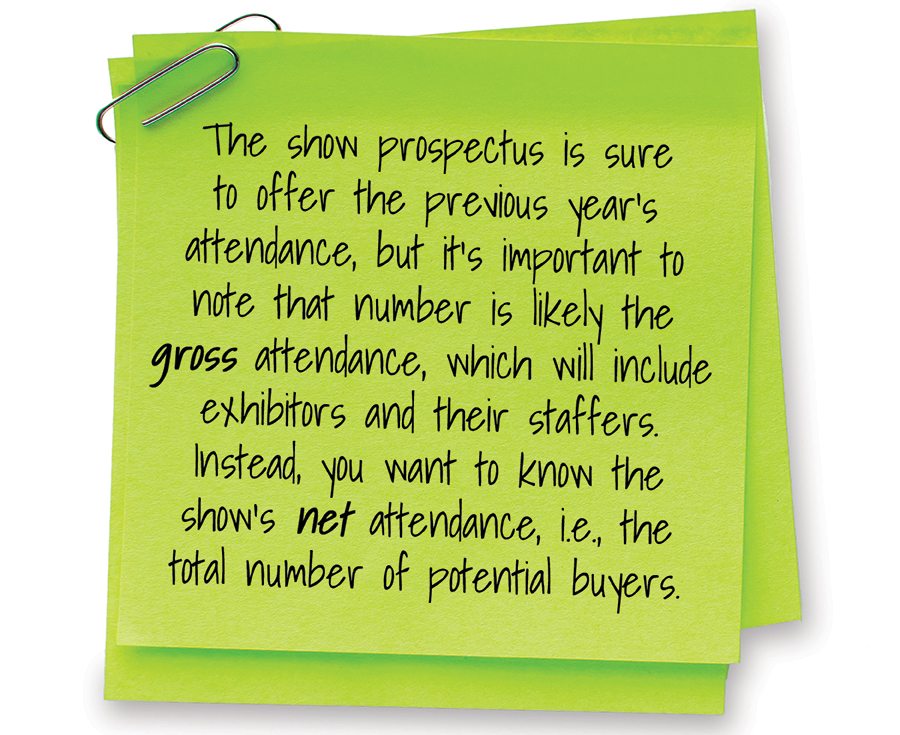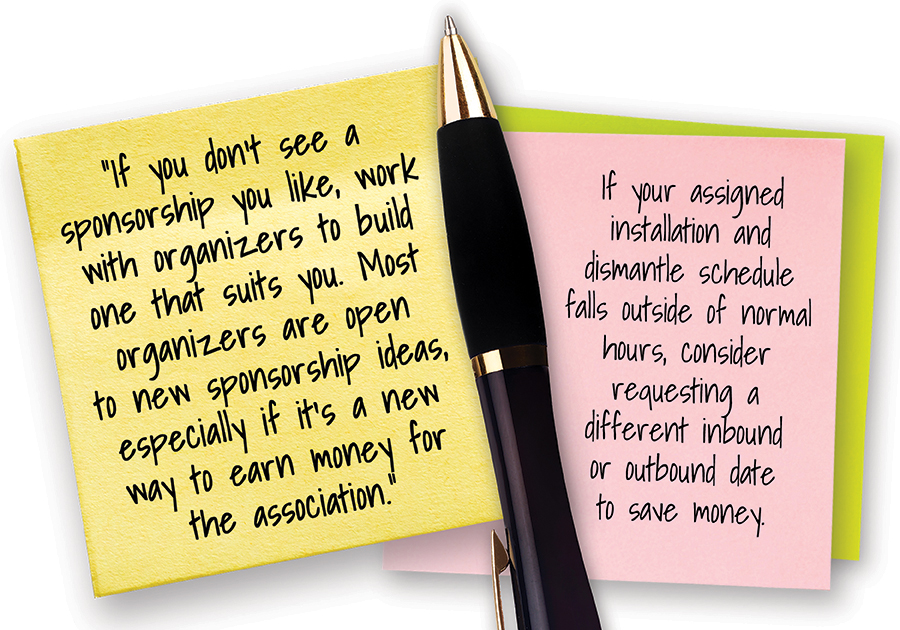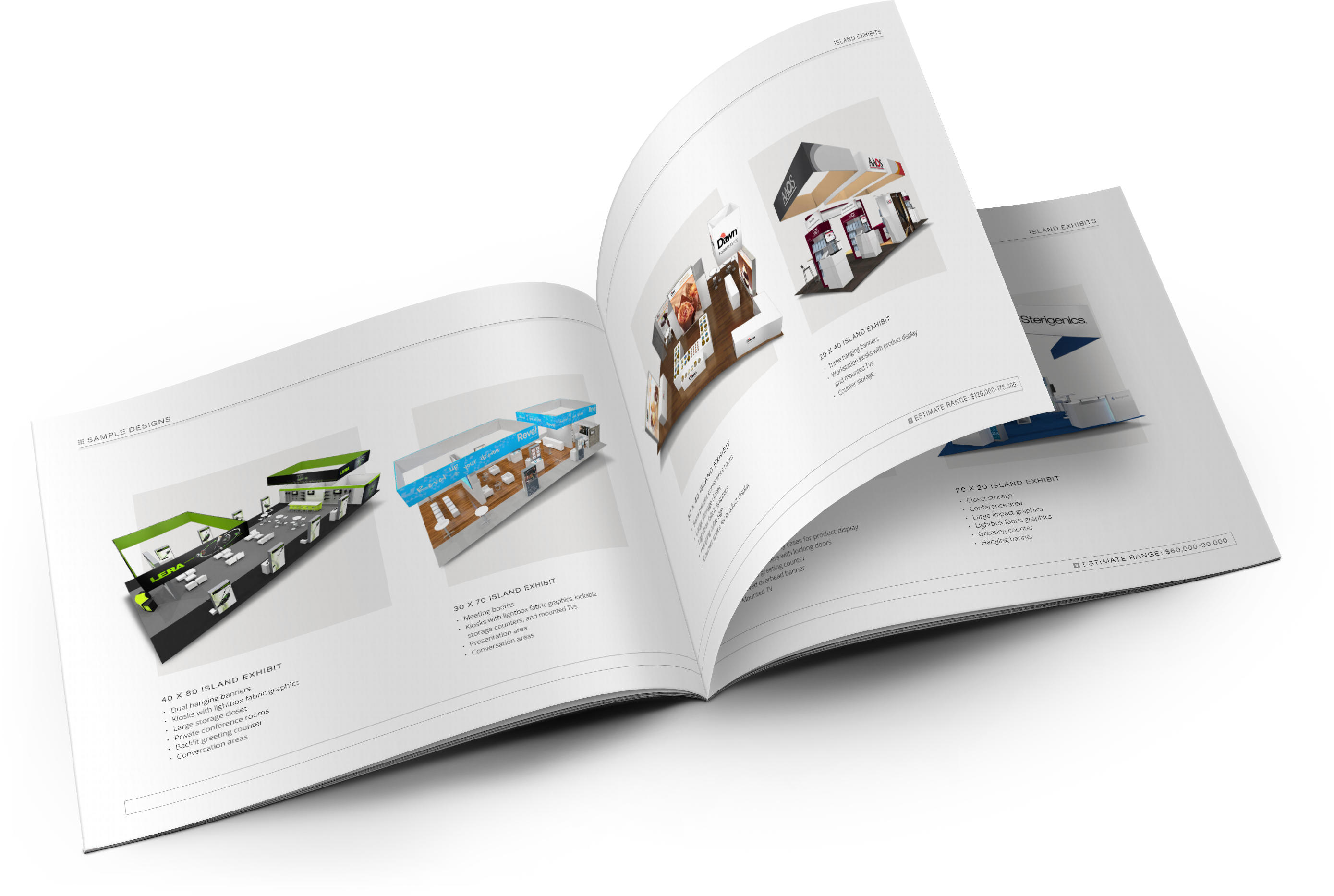 Will my buyers be there?
Will my buyers be there?Just about all our experts suggest leading with this query. "It may sound generic, but it really is the make-or-break question because it indicates whether you should go and informs your decision about how much time and money to invest," says Deanna Krause, CTSM, trade show and event consultant for Tradeshow Warrior. The show prospectus will give you some of that information. For instance, attendees will likely be broken down into large buckets, such as what percentage of them have buying power and what sectors they represent. "While that information is useful," Krause says, "it probably won't let you know whether your big fish will be present on the show floor. Ask about your very specific target demographic. Say you manufacture hand tools and you need to target people at the director level or above from companies such as Home Depot, Lowes, etc. Ask how many of those specific attendees usually attend the event." Organizers likely won't give you specific individuals' names, but they should be able to give you enough information to let you know whether the key decision-makers will be in the hall.
Additionally, inquire about where the audience is coming from, says Debbi Kemp, senior manager of experiential marketing for Canon Medical Systems USA Inc. "If a large base of attendees is international and your budget is focused on domestic growth, it might be worth taking a second look at participating," she says. "Spending precious dollars on an audience that will not increase your market share probably isn't a wise decision." Bottom line: If the show organizer cannot demonstrate your key buyers will be at the event, don't waste your money.

 What are organizers doing to drive attendees to the show floor?
What are organizers doing to drive attendees to the show floor?The words you'll want to hear in show organizers' response are "unopposed exhibit hall hours." "You should be looking for blocks of dedicated exhibit time long enough for visitors to comfortably cover the exhibit hall," says Judy Volker, owner and principal at Volker Marketing Services LLC. After all, if your prospects show up, but the exhibit hall is an afterthought or just a place to grab a beverage, you're wasting your time and money. The event schedule may state, for instance, that the exhibit hall is open for seven hours on each of three days. Twenty-one hours of exhibition time sounds great on the surface, but that doesn't mean the majority of attendees are going to be wandering the aisles for much of that time. Trade shows often include a conference component where attendees are sitting through educational sessions for much of the day. That might mean there are only six total hours in which the exhibit hall is open with nothing else vying for their attention.
Of course, if those hours also coincide with lunchtime, you can bet your bottom dollar that most attendees are going to be searching out food instead of your exhibit. "This is a bigger problem now than it used to be," says Glenda Brungardt, CTSM, strategic trade show and event manager for HP Inc., "because many venues' food courts are closed because of labor shortages." That means visitors have to leave the building to find food. "If organizers are just allocating session breaks and the lunch hour as free show-floor time, that's not ideal quality time with a customer," Kemp says. "Is the show offering early morning opportunities, happy hours, or other activities on the show floor? Anything to bring attendees and keep them engaged in the hall increases your chances of success."
 What is the net attendance from the past several years?
What is the net attendance from the past several years?The show prospectus is sure to offer the previous year's attendance, but it's important to note that number is likely the gross attendance, which will include exhibitors and their staffers. Not many of those will be your target audience. Instead, you want to know the show's net attendance, i.e., the total number of potential buyers. "Basing your goals or forecasted ROI on inflated numbers won't help you make smart decisions," Krause says. "It's also worth asking for the net attendance for the previous three to five years to see whether the event is growing or shrinking. You will need to factor out unique circumstances like the pandemic, but shrinking attendance may be an indication that top buyers and decision-makers are skipping out."
On the other hand, a high rate of growth portends an expanding market. If that's the case, you probably want to get in there and compete. Consider it a warning flag if the show cannot or will not share the net attendance. "The organizer may have less experience at running shows and may not know the value of the data," Krause says. "Or worse, they could be trying to hide the fact that the show is shrinking. Be on your guard."
 Will I get an attendee list, and what information will I have access to?
Will I get an attendee list, and what information will I have access to?Pre-show marketing is a key component to drumming up booth visits, so you'll want to acquire the attendee list as early as possible. Lots of events require exhibitors to pay for the list, but consider that negotiable, our experts say. If management doesn't include the list as a perk of buying booth space, see if they'll package it into the price of a sponsorship. But be sure to ask what's included in the list, as Volker has observed that some don't include email addresses. And some shows, especially association-hosted events, stipulate that there can be no pre-show communication used to engage attendees. If your strategy is to preschedule meetings or build interest, such an arrangement won't fill up your calendar.
Brungardt also suggests inquiring about how the attendee list is vetted. This is especially important today because of the economic upheaval that has seen masses of people moving positions or shifting to other industries. "I want to know that the event isn't working off last year's list, which is likely to be outdated," she says. "A well-managed show should demonstrate that they are working from an up-to-date list that's been audited by a verifiable third party." Along the same lines, check to see whether you have to pay extra for data from badge scans. "This is a big pet peeve of mine," Brungardt says. "I should not have to pay to extrapolate the data off an attendee's badge that we've scanned. When I buy booth space, I want to know that I'm also buying access to each attendee who stops by my booth."
Promotions
 What steps are you taking to help set your exhibitors up for success?
What steps are you taking to help set your exhibitors up for success?The burden of success will mostly fall on your shoulders once you decide to buy booth space, but show management should also be doing its part. "One of the biggest problems for show organizers is the attrition of exhibitors, so they should invest in making newcomers successful," Krause says. Some events, according to Krause, will provide booth evaluations your first year where they'll hire someone to come in and let you know what's working and what needs improvement. Others might allow exhibitors to host attendee roundtables or networking events off the show floor.
Alternatively, check whether the show has an active Exhibitor Advisory Committee, suggests Robyn Davis, CPTD, trade show trainer/consultant and owner of Exhibitors WINH LLC. An active EAC often indicates that show organizers are listening to their exhibitors to ensure the show is evolving in a mutually beneficial way. "Confirm that the show is making decisions that align with your current needs and your vision for the future," Davis says. "You'll also want to ask who is involved in the EAC to ensure exhibitors similar to you aren't overlooked."

 What promotional opportunities are available to me?
What promotional opportunities are available to me?Promotional opportunities are key for exhibitors to boost brand awareness and build booth traffic. The most obvious of these is in the form of sponsorships, most of which will be listed in the prospectus. However, don't settle for just what's on the list. "If you don't see a sponsorship you like, work with organizers to build one that suits you," Kemp says. "Most organizers are open to new sponsorship ideas, especially if it's a new way to earn money for the association."
New exhibitors might be reluctant to spring for big-ticket sponsorships such as lanyards or show bags, so Krause suggests inquiring about free or low-cost promotional options. "At a minimum, organizers should give you a listing in the show guide and on their app," she says. "Ask whether new exhibitors get mentioned in a press release, printed buyer's guide, etc., or if there is a pre-show article you can be a source for." Every little bit helps. "More than once I've had a show let me have a complimentary registration- bag insert as a first timer or allow me to initiate promotions that aren't in the prospectus," Volker says. "This is especially important for companies that cannot afford the more expensive sponsorships. It never hurts to ask."
Also inquire about speaking opportunities. "These are a fantastic way to establish credibility and boost brand awareness. A lot of events, especially tech shows, have presentation spaces right on the show floor," Krause says. Volker argues that a good speaking gig is a great way to offset the cost of exhibiting and gain an additional touchpoint with attendees, so snatch one up if it's available. Just be sure to inquire about the rules of engagement because many events require that the sessions need to be educational with limited or no promotional content.
 Can you put me in contact with similar exhibitors that have exhibited before?
Can you put me in contact with similar exhibitors that have exhibited before?Trade show exhibitors are as unique as the individual attendees they target, so in order to imagine what your experience might be like at a trade show, Davis recommends seeking out a similar exhibitor's perspective instead of relying on testimonials in a prospectus. "Take generic feedback with a grain of salt," says Davis. "When you can speak with someone who is similar to you in areas like size, motivation, and audience segment, that's a much better starting point." But, that's not all – be sure to take note of what those exhibitors did to earn their success at the show because "if you aren't willing to put in a similar effort, it's unlikely you will achieve a similar result," she explains. And remember: If the exhibitor list shows a lot of companies in your category, but your organizer won't provide any relevant introductions or more specific case studies, there may be more to the story.
Logistics
 What additional costs might I encounter?
What additional costs might I encounter?It's important to inquire about costs that go beyond the purchase of booth space and sponsorships. If, for instance, you're required to use an advance warehouse for shipping, costs may rise. Then there's drayage. Plus, due to the current worker shortages, some large shows have to fly in laborers and then pass those expenses on to exhibitors.
Relatedly, you'll also want to know when your installation and dismantle is scheduled to take place. Labor costs on a Saturday are usually on overtime, which means workers are charging time and a half. Sundays and major holidays are usually double time. Brungardt cautions to be extra vigilant about checking out holidays that fall on the weekend. For instance, if New Year's Day falls on a Sunday, Monday becomes the observed holiday at double time. "All of these things should be clearly called out in the exhibitor manual, but sometimes they're not," Brungardt says. "When you're not sure, you need to ask. Otherwise, you may be in for an unpleasant surprise when you get the bill." If your I&D will occur outside of normal hours, consider requesting a different inbound or outbound date.
 Who will be my direct contact within your team moving forward?
Who will be my direct contact within your team moving forward?At some shows, the sales process is run by a different team than the one that handles ongoing client services, so ensure that your initial (hopefully positive) experience will continue beyond signing your booth-space contract. "Ideally, you'll be able to meet your contact and confirm they're comfortable communicating by phone or video chat in case you have questions that need to be talked through more easily than an email thread," Davis says. Ask again if organizers direct you to a website instead of a person. "Although it's likely you'll be able to find most of the information you need online," Davis adds, "you may need more clarification as you get used to the way they run the show. So you'll want to be sure you can get answers in a timely manner."
 Can I see the floorplans?
Can I see the floorplans?This may not be a make-or-break question, but it should help you avoid some headaches down the road. For instance, you'll want to see where your booth options are in relation to entrances and exits and check for column locations and ceiling heights. But there's more to it than that, according to Volker. More and more organizers are "awarding" priority footprints based on total dollars spent at a show, as opposed to basing it on a company's senior tenure in the exhibit hall. So you'll want to see what doors an extra sponsorship might open for you. You might find the preferred location (and the extra cost that comes with it) is worthwhile.






